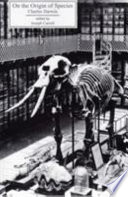 | William Coleman - 1977 - 204 pages
...was that selection would give new direction to the breed. The "key" to these changes, said Darwin, "is man's power of accumulative selection: nature...adds them up in certain directions useful to him." He then posed, with every hope of a positive response, the decisive question: "Can the principle of... | |
 | Peggy Cornett Newcomb - 1985 - 224 pages
...nature of flowers and the process of pollination.27 This knowledge, along with Darwin's concept that "the key is man's power of accumulative selection;...variations; man adds them up in certain directions useful to him,"28 served to extend the powers of cultivators still further. Ironically, though the basic workings... | |
 | George Levine - 1991 - 334 pages
...and are only controlled by domestic breeders, who select some and reject others. "Nature," he says, "gives successive variations; man adds them up in certain directions useful to him" (p. 90). Variability is simply the inexplicable given for Darwin. It is true that for the purposes... | |
 | Gary Cziko - 1997 - 404 pages
...and animals changed over time to become better adapted to human needs. He explains these changes as "man's power of accumulative selection: nature gives...directions useful to him. In this sense he may be said to make for himself useful breeds."1 When he realized that such selection pressures also exist in nature... | |
 | Keith Ansell-Pearson - 1997 - 296 pages
...selection. The latter is but the human attempt to channel an inhuman process, or in Darwin's words: 'nature gives successive variations; man adds them up in certain directions useful to him' (Darwin 1993: 127). Yet after establishing this analogy in chapter 1 of the Origin of the Species Darwin... | |
 | Nicholas Wright Gillham - 2001 - 429 pages
...selection themselves. One imagines he would have noted this statement from Darwin's book. "We cannot suppose that all the breeds were suddenly produced...variations; man adds them up in certain directions useful to him."7 Galton's belief in the heritability of talent and character was reinforced not only by his own... | |
 | Graeme Donald Snooks - 2003 - 366 pages
...see in the adaptation, not indeed to the animal's or plant's own good, but to man's use or fancy. ... The key is man's power of accumulative selection:...directions useful to him. In this sense he may be said to make for himself useful breeds. (Origin: 89-90) He emphasizes that this "principle of selection" is... | |
 | Charles Darwin - 2003 - 676 pages
...purposes, or so beautiful in his eyes, we must, I think, look further than to mere variability. We cannot suppose that all the breeds were suddenly produced...perfect and as useful as we now see them; indeed, in several cases, we know that this has not been their history. The key is man's power of accumulative... | |
 | Don S. Browning, Terry D. Cooper - 324 pages
...animals that possessed the desired quality. As Darwin wrote in Origin of the Species (1859): We cannot suppose that all the breeds were suddenly produced...not been their history. The key is man's power of accumulation selection: nature gives successive variations; man adds them up in certain directions... | |
| |